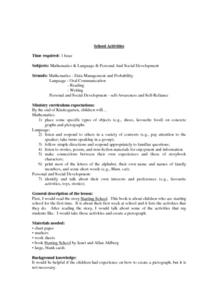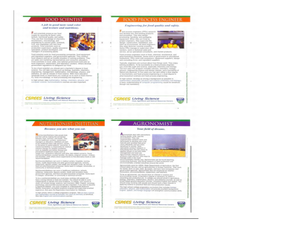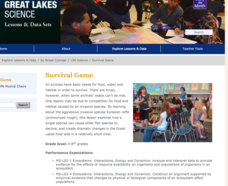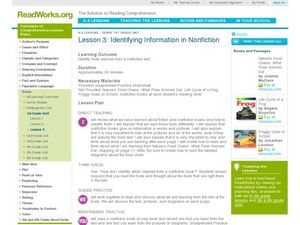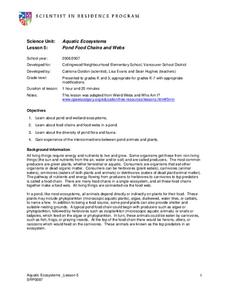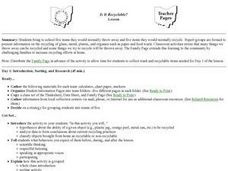Curated OER
School Activities
First graders place some specific types of objects (e.g., shoes, favorite food) on concrete graphs and pictographs. They listen and respond to others in a variety of contexts (e.g., pay attention to the speaker; take turns speaking in a...
Curated OER
Michigan Food: From Farm to You
Learners recognize Michigan on a map and understand how its climate is affected by the Great Lakes. In this Michigan food lesson, students play a trivia game to identify the produce of Michigan. Learners relate the climate in each part...
Curated OER
Six Levels of Ecological Organization
Ninth graders describe the six levels of ecological organizations and give examples of each. They also differentiate between food chains and webs and identify trophic and consumer levels in food chain and food webs.
NOAA
Build Your Own Ocean Ecosystem
Hold the sea in the palm of your hand! Amateur oceanographers work together to create models of an ocean ecosystem in the sixth and final installment in a series. Raise awareness of global ocean health issues through guided research,...
Curated OER
Open Inquiry Using C. elegans
Ever wondered what motivates a roundworm? Introduce your biology class to C. elegans, a non-parasitic model organism that can help them understand behavioral stimuli. Paired pupils design an experiment to test the worm's reaction to...
Curated OER
Habitat survival
Sixth graders study different environments and how the food chain affects the survival of different animals. In this environments lesson plan, 6th graders share the visuals which describe the characteristics of the environment that they...
Curated OER
Vocabulary: Kansas Prairies
Students explore the ecosystem by reviewing scientific vocabulary terms. In this environmental awareness lesson, students identify the differences between abiotic and biotic factors and their relationship to the Earth. Students define...
Curated OER
Breakfast for Champions
Students prepare an event to honor philanthropic activities in their community. In this common good lesson plan, students send out invitations to local non-profits or to those who engage in philanthropic activities and plan an awards...
Curated OER
Service Learning Project
Students plan a service project to contribute to their community and then reflect on their experience. In this service project activity, students help in a food pantry or donation center in their community. Students then write statements...
Curated OER
Environment
Students examine how connected they are to the environment and how organisms are affected by other organisms. They also discover that the environment is affected by human interactions.
Curated OER
Worming Your Way Through the Soil
Students study soil, living and non-living particles in the soil, and learn about composting. In this soil study lesson, students study soil samples and discuss the living and non-living components of the soil. Students classify the...
Curated OER
The Void Filled by Nonprofits
Students examine the significance of nonprofit organizations in a democratic society. They conduct research on a selected nonprofit organization, complete a questionnaire, and present their findings to the class.
Curated OER
Worms: Nature's Recyclers
Learners explore vermi-composting. In this vermi-composting lesson, students listen to the story Diary of a Worm and discuss the parts of a worm. They create worm bins and add organic food for the worms to recycle.
Curated OER
Living and Non-Living
Students discover the basic needs of life. In this science lesson plan, students explore how all living things need air, water, food and shelter
Curated OER
Classifying Living and Non-Living Objects
Students investigate living organisms and define the properties of a living species. In this life characteristic lesson, students examine plants in their class and discuss whether or not they are alive. Students create a...
Curated OER
Ecosystem Organization - Lesson Plan
Student explore ecosystems. In this ecosystem organization lesson, students consider how scientists study living organisms. Students participate in a teacher guided activity that requires them to visualize an organism and imagine its...
Curated OER
Lesson 1: Identifying Information
Factual books about animals are great for sparking interest in non-fiction text. Little ones will love learning about the foods animals eat as they practice identifying facts in a text. They chart the information they've learned by...
Curated OER
Reviving Celery
The classic in-class demonstration using celery dipped into water with food coloring is the highlight of this biology lesson plan. Young scientists discover that organisms are made up cells and have distinguishing characteristics. After...
Curated OER
Exploring Countries and Cultures
Fifth graders choose a country associated with a family member and research its location, government, language, economy, history, holidays, foods, sports, and famous people. They write to inform using this data and draw a map identifying...
Michigan Sea Grant
Survival Game
Musical chairs may be a classic game, but Ruffe Musical Chairs is a unique lesson on invasive species! Using the time-honored game, pupils role play the behaviors of the invasive fish called Eurasian ruffe. Learning about this aggressive...
Curated OER
The Long Road to Coffee
Learners discover how coffee is processed from a plant, to a drink. For this life cycle lesson, students study that cells and organisms go through a cycle of growth and change. Learners organize picture cards, illustrate how coffee...
Curated OER
Identifying Information in Nonfiction
Second graders investigate information in non-fiction texts. They review the features of a non-fiction text and read the book Nature's Food Chains: What Polar Animals Eat. Pupils discuss the text features and write down one fact they...
Curated OER
Aquatic Ecosystems
Students study ponds and wetland ecosystems and examine the food chains and webs in them. In this aquatic ecosystems lesson plan students answer questions about the diversity of the flora and fauna in a pond.
Curated OER
Is It Recyclable?
Learners bring to school five items they would normally throw away and five items they would normally recycle. Expert groups are formed to present information on the recycling of glass, metal, plastic, and organics such as paper and...
